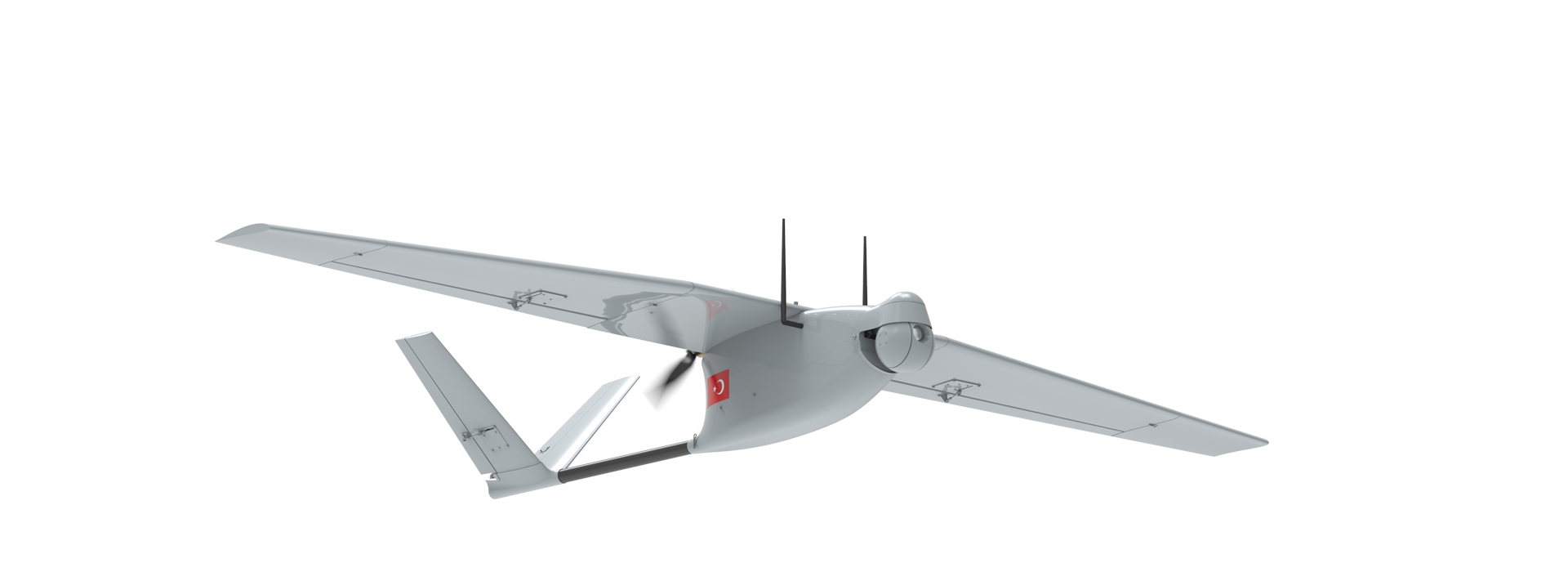In a conflict that is shaping up to be one of the most intense and rapidly developing of our time, drones have come to play an increasingly important role, and could well end up being one of the pivotal factors in its eventual conclusion. Thus, the delivery of at least 16 additional Bayraktar TB2 UCAVs, on top of the 18 already in Ukraine's pre-war inventory, constitutes perhaps one of the most significant instances of support to Ukraine's plight yet. [1] Now evidence has emerged that Turkey's drone contributions have not remained limited to the TB2, with new combat footage of Baykar's Mini-Bayraktar UAV confirming their delivery to the country. [2]
Though the Mini-Bayraktar is visually much less glamorous than its larger UCAV brethren, being a hand-launched design optimised for surveillance and reconnaissance, it is precisely this type of design that can prove invaluable in improving the combat efficacy of ordinary infantry units. Furthermore, the Mini-Bayraktar was continuously improved since its inception, with the newest D variant featuring a communication range of 30 kilometres, around 120+ minutes of endurance and a maximum altitude of some 1200 metres. [3] This is in keeping with the iterative improvements that also contributed to the Bayraktar TB2's success, and that have come to define Baykar as perhaps the single most successful exporter of UAVs worldwide.
The big advantage of UAVs like the Mini-Bayraktar is that they can easily carried and deployed by ordinary soldiers in the field, requiring no runway either for launch or recovery. They can then be utilised for spotting targets to be engaged either by ATGMs and other light equipment or more typically artillery units. In such operations small UAVs (including the more rudimentary off-the-shelf quadcopter types) have already contributed to stunning losses to Russian forces around Kiev, which were essentially sitting ducks for Ukrainian artillery so long as they could be accurately spotted.
In footage from Ukraine showing a Russian soldier being tracked to his unit, which is later engaged by Ukrainian artillery, the Mini-Bayraktar's distinctive interface can be clearly identified. [4] The Russian BMP-2 caught in the resulting fire was apparently abandoned, though damage to the vehicle cannot be assessed. This engagement perfectly demonstrates the Mini-Bayraktar's intended use-case, and showcases the utility of its high-definition gimballed camera. Its solid jamming resistance and excellent endurance will also come in handy over Ukraine's vast embattled fields and forests, with a simple parachute and belly landing recovery system enabling simple and quick operations by units in the field. [5]
In footage from Ukraine showing a Russian soldier being tracked to his unit, which is later engaged by Ukrainian artillery, the Mini-Bayraktar's distinctive interface can be clearly identified. [4] The Russian BMP-2 caught in the resulting fire was apparently abandoned, though damage to the vehicle cannot be assessed. This engagement perfectly demonstrates the Mini-Bayraktar's intended use-case, and showcases the utility of its high-definition gimballed camera. Its solid jamming resistance and excellent endurance will also come in handy over Ukraine's vast embattled fields and forests, with a simple parachute and belly landing recovery system enabling simple and quick operations by units in the field. [5]
 |
Left: Footage taken of a Russian position under fire by a Bayraktar Mini UAV. Right: Comparative footage of a Bayraktar Mini using a FLIR camera in Turkey. |
Though Turkey has so far asserted itself as the premier supplier of UAVs to Ukraine during the conflict, and in consequence as one of its most significant allies overall (being one of only few nations committing to delivering heavy equipment), the Mini-Bayraktars will soon be joined by a number of other designs. Notably, the US has pledged to support Ukraine with RQ-20 Puma reconnaissance UAVs (a design similar to the Mini-Bayraktar) and a number of Switchblade 300 loitering munitions. The Switchblade 300s are expected to introduce a very capable and novel capability to Ukraine's military, and 1000 of the expendable munitions were reported to be sent. [8]
Deliveries like these could be the crucial factor allowing Ukraine's military to gain the upper hand against a vastly numerically superior enemy. Other than conventional armament like small arms and armoured fighting vehicles (AFVs), weapons like the Mini-Bayraktar act as force multipliers, increasing the efficacy of all other armament deployed in the same area. With sufficient force multipliers of high quality in place, the losses ratio between both sides can be skewed even further beyond its already surprisingly unbalanced state, ultimately forcing Russian military planners to reconsider the utility of continued offensives. It is up to Ukraine's allies abroad to rise to the task of providing it with the means to achieve this goal, thereby deciding the fate of Europe in one of the most consequential wars of our time.
[1] Ukraine's defence imports from Turkey jumped 30-fold in Q1 - Turkish data https://www.reuters.com/world/ukraines-defence-imports-turkey-jumped-30-fold-q1-turkish-data-2022-04-06/
[5] GELİŞMİŞ ÖZELLİKLERİYLE BAYRAKTAR MİNİ İHA D https://youtu.be/uFyQrg2E800?t=117
[6] Turkey sells mini drones to Qatar https://www.hurriyetdailynews.com/turkey-sells-mini-drones-to-qatar-15862
[7] Procurement: Turkey Exports UAVs https://www.strategypage.com/htmw/htproc/articles/20120319.aspx
[8] U.S. sending Switchblade drones to Ukraine in $800 million package https://www.politico.com/news/2022/03/16/us-sends-switchblade-drones-to-ukraine-00017836

.png)






